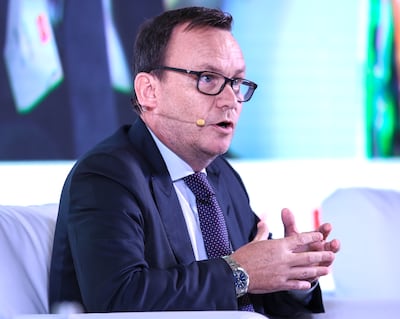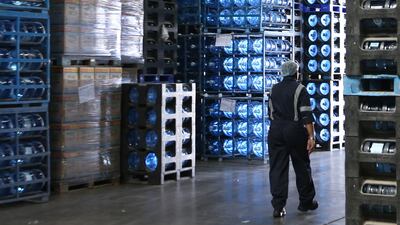Abu Dhabi-based food and beverage company Agthia Group aims to grow its revenue by up to 12 per cent this year as it continues to focus on expanding its business.
The company, owned by Abu Dhabi's state holding company ADQ, reported a more than 33 per cent surge in revenue to Dh4.07 billion ($1.1 billion) in 2022. Profit rose 14 per cent annually to Dh247 million.
“We are very positive about the outlook [of our business],” Alan Smith, group chief executive of Agthia, told The National in an interview.
“Our priority is just to scale up in the markets where we already have a presence.”
Agthia manufactures, distributes and markets a range of food and beverage products, including popular regional brands such as Al Ain Water and Al Foah dates.
The company’s assets are located in the UAE, Saudi Arabia, Kuwait, Oman, Egypt, Turkey and Jordan, with distribution in a number of countries, including China, India, Brazil and Indonesia.
Agthia also has a tie-up with retailers, including Walmart, to sell its products in the US, the world’s largest economy.
Currently, more than 51 per cent of Agthia's revenue comes from overseas markets, with Egypt being the main contributor.
The company is transforming its operations under a five-year growth strategy to become the region's top food and beverage company by 2025. It is aiming for an annual revenue of Dh6 billion in the next two years.
“When we set out our five-year strategy, it was quite bold,” Mr Smith said.
“We want to be a leading food and beverage company in the region by 2025 and we have made massive progress towards that.
“We will continue to focus on the three pillars, which include growth, both organic and inorganic, through mergers and acquisitions, efficiency and developing capability.”

The Abu Dhabi-listed company made a number of new acquisitions in the past two years to expand its business.
These include the world’s largest date processing and packaging company Al Foah, Kuwait’s Al Faysal Bakery and Sweets, Jordan’s Nabil Foods, Egypt-based meat processor Ismailia Investments, also known as Atyab, and snacks maker BMB Group.
In December, it also bought a majority stake in Egyptian snacks and coffee producer Auf Group for an undisclosed amount.
“We will keep developing the pipeline,” Mr Smith said.
“We continue to look for the right opportunity at the right price, in the right market and in the right category.
“We have an M&A [mergers and acquisitions] team constantly looking at opportunities out there in the market.”
The company has Dh1.5 billion in “firepower to keep looking at potential targets”, he added.
Agthia's business was affected by soaring inflation globally and higher commodity prices due to the Ukraine conflict.
Input costs rose by about Dh270 million last year, Mr Smith said.
“A fairly significant chunk impacted the business, if you look at our profit margins, we have been able to navigate through that.”
The biggest challenge came in “our agri sector with the escalation [of the conflict] in Eastern Europe that drove wheat prices up very aggressively in quarter two and quarter three”, he said.
Global inflation rose to 8.8 per cent in 2022, as commodity prices spiked.
Following monetary tightening and the easing of prices, inflation is expected to fall to 6.6 per cent in 2023 and 4.3 per cent in 2024, still above pre-pandemic levels of about 3.5 per cent, the International Monetary Fund said in a recent report.
About 84 per cent of countries are expected to have lower headline inflation in 2023 than in 2022.
In 2023, oil prices are projected to fall by about 16 per cent, while non-fuel commodity prices are expected, on average, to fall by 6.3 per cent, the fund said.
Agthia is “cautiously optimistic” about the outlook for inflation and commodity costs over the course of the year as pandemic restrictions ease and oil prices fall, Mr Smith said.


